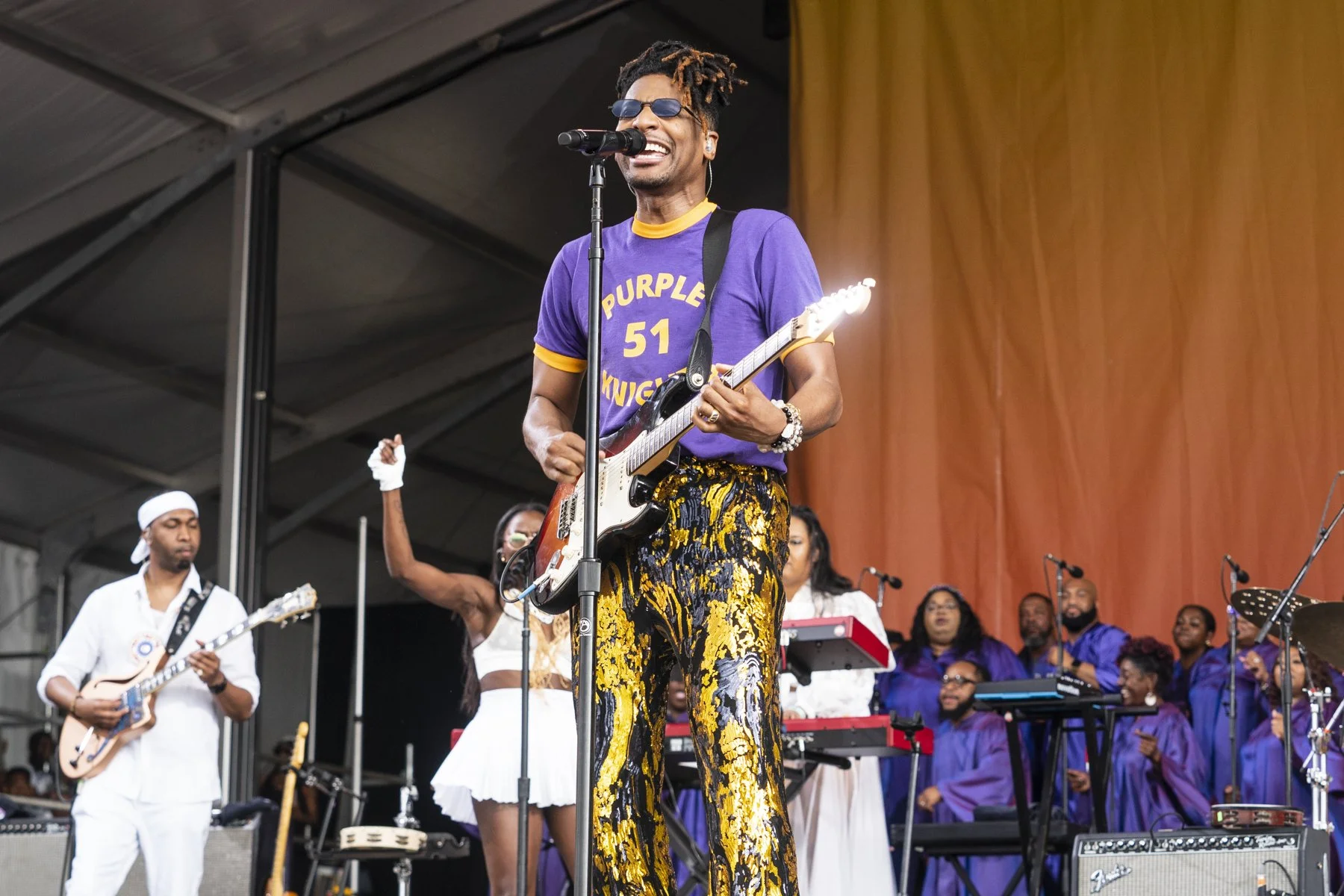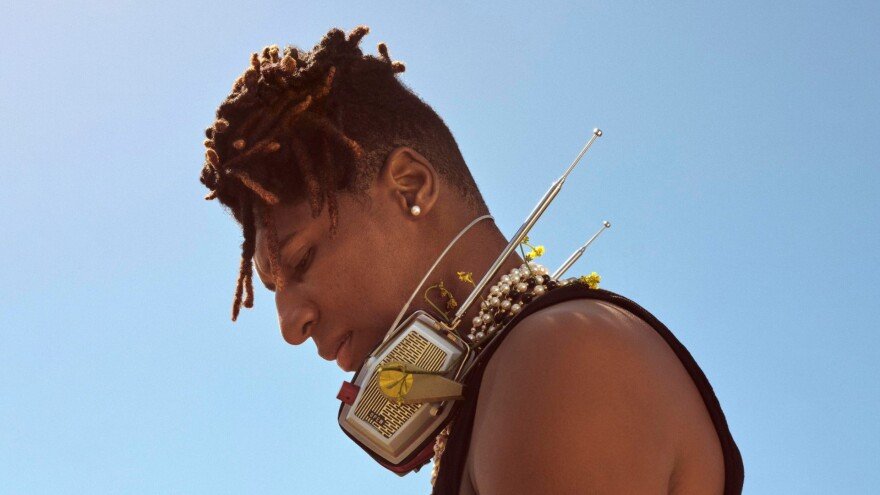Hurray for the Riff Raff, Curren$y, Stayed True to Themselves at Jazz Fest

Saturday Alynda Segarra was a work in progress, and Spitta just seemed happy to be at the Fair Grounds.
Music is only part of the story at Jazz Fest, which is part of why covering it is so interesting. It’s a business story, so one thing that has to be taken into account in pieces that praised Katy Perry’s show—which was fine and did as much spectacle as she could manage under the circumstances—was that the number two name on the festival’s initial lineup release was a soft draw, particularly of young people. The folding chair village was full, but there was a lot of standing room on the track-side of the stage. She’s professional and likable, so her show worked, but it didn’t attract the number of attendees top line artists usually draw.
Similarly, Hurray for the Riff Raff played a strong set in front of Perry on the Acura Stage, but it’s not clear that it landed with the audience. Seventy-five or so yards from the stage, people were talking as if no one was onstage, and friends in the bleachers thought that something was lost in the distance. I found the set committed and daring, but I understand those who zoned out when Alynda Segarra sang a song that had “I love you just the way you are” as its only lyric, but I connected to the way she tested phrasings of the line to see how they changed meaning, and I admired her willingness to take that chance in front of a Katy Perry crowd.
Her riff on Langston Hughes’ “Kids Who Die” was always going to a struggle with an audience there to sing along to “Teenage Dream.” Still, Segarra committed to her art, which is often political and pointed. “There’ll be no monuments for kids who die / but in our songs there’ll be,” she sang amid Springsteen-like surges. The song repeated the phrase “Kids who die” enough times for it to speak not only to the Civil Rights Movement context in which Hughes wrote the poem, but to all the ways kids die today. Segarra let readers free-associate the phrase as they will, to kids overdosing on opioids that we’re still not doing enough about, and to Black kids who end up shot by police and their proxies as Trayvon Martin did—someone Segarra wrote a song for in 2013.
Segarra is, as our interviews Saturday showed, a work in progress, and that was clear in her performance. She presented a more pop look with a black see-through top, green faux-snakeskin pants, and blonde hair with bangs falling in her eyes, and during “Hungry Ghost” she bounced and danced around as if the show was going to be Hurray for the Riff Raff’s pop set. Soon though, it became clear that the look is only one step down a path that she’s still charting, and that her purposeful mode remains dominant. Musically, that translated to moments that evoked Patti Smith and Bob Dylan.
The set ended with an impassioned “Pa’lante,” which she introduced in her longest address to the audience. The phrase means “Move forward,” Segarra explained, and “We need to move forward as one.” The song’s first half is punctuated by lines the invoke quiet desperation—“Be something,” “Do something”—for people who aren’t sure how to do either, and the second half answered the lines’ implied questions with “Pa’lante.” What should I do? Pa’lante.
It was the kind of song and moment that has caused so many people—me included—to buy into Hurray for the Riff Raff. Alynda Segarra’s willingness and ability to go for a smart, well-earned, dramatic and meaningful moment when something real is being said buys her time to figure things out. And odds are, she will. As if to answer those who wanted more and simpler fun, Hurray encored with a joyful cover of Blondie’s “Dreaming.”
New Orleans rapper Curren$y explained that the last time he was at Jazz Fest it was a school field trip, and he seemed amused by everything about the experience of being on the Congo Square Stage Saturday. He pointed out his mom, who was recording the show on her iPad, and he joked with someone else in the crowd: “Soon as I saw your shirt, I knew which songs I had to play.”
He got through a lot of them in his hour-long set because he cut most of them off after a verse or two. That has become the hip-hop way, but at least Curren$y brought his to an ending rather than jus cut them off abruptly with an airhorn or shotgun sound effect as often happens. The live band helped him find musical solutions including how to play songs that can turn any time of day into the late part of the night. Live horns brightened his sound and helped rub a little of the 2 a.m. off of Ski Beats’ beats.
The band entertained Curren$y too when he speculated on how nice it would be to wake up to live brass band music in the morning. “Can you be there at 8:30?” he asked the band. “Invoice me.”
The set was an auspicious Jazz Fest debut for Spitta, who showed rap chops as well, changing his flow at times to underline the fundamental musicality in his music. He certainly got over with the crowd that was there to see him as well as those that were there to stake out space for Logic.
Here are our picks for Sunday at Jazz Fest:
Mdou Moctar
12:25 p.m., Blues Tent; 3:10, Cultural Exchange Pavilion
We spoke to Moctar recently about how he squared his Muslim faith with his music
The New Orleans Jazz Orchestra’s Tribute to Aretha Franklin
1:45 p.m., WWOZ Jazz Tent
Alex Rawls’ two-part story on the death and rebirth of the NOJO from 2018
Royal Teeth
2:45 p.m., Gentilly Stage
My Spilt Milk talked with Royal Teeth about life after “Wild” on Election Day 2016
Bleachers
4:05 p.m., Gentilly Stage
A Tribe Called Red
4:20 p.m., Jazz & Heritage Stage
Alex Rawls interviewed the First Nations DJs when they first played Jazz Fest in 2013
J Balvin
5:55 p.m., Gentilly Stage






